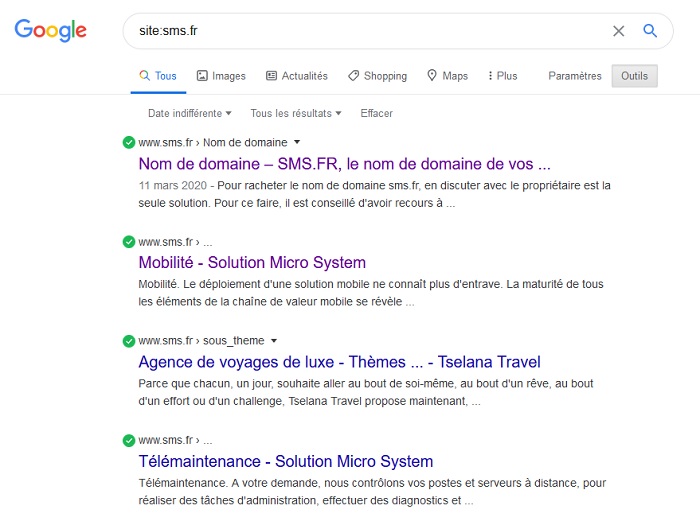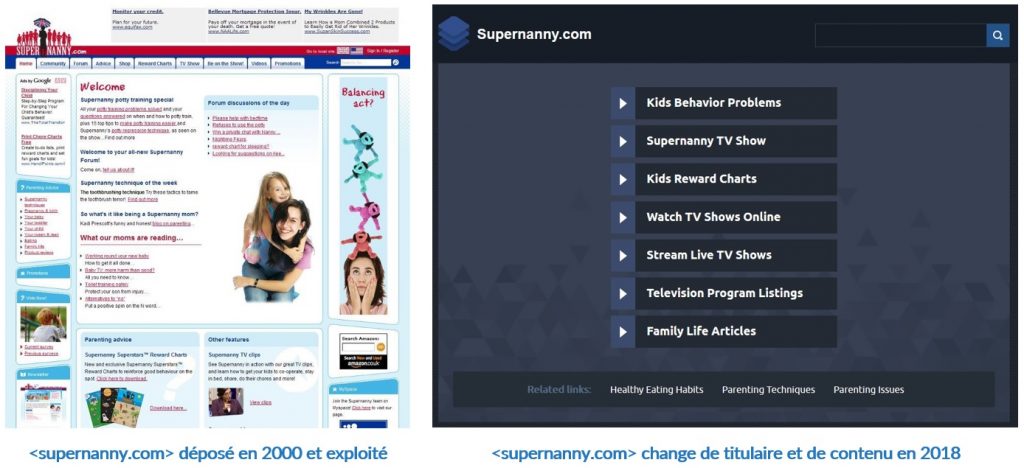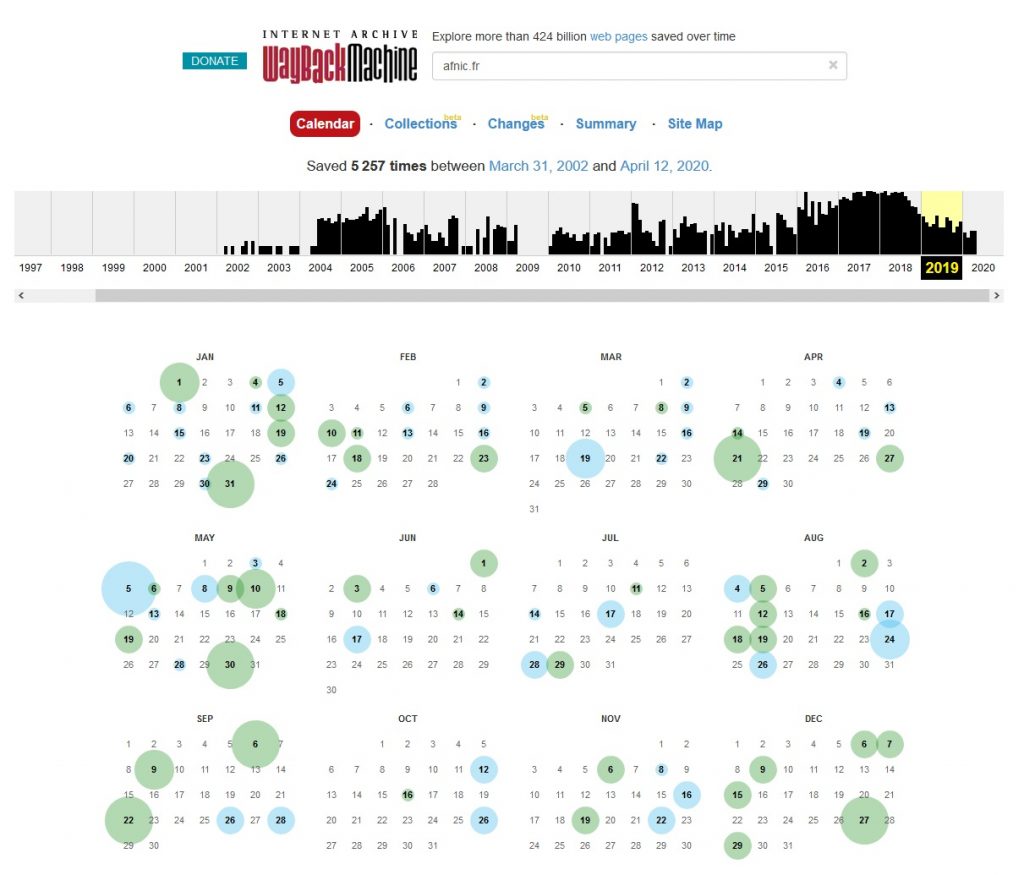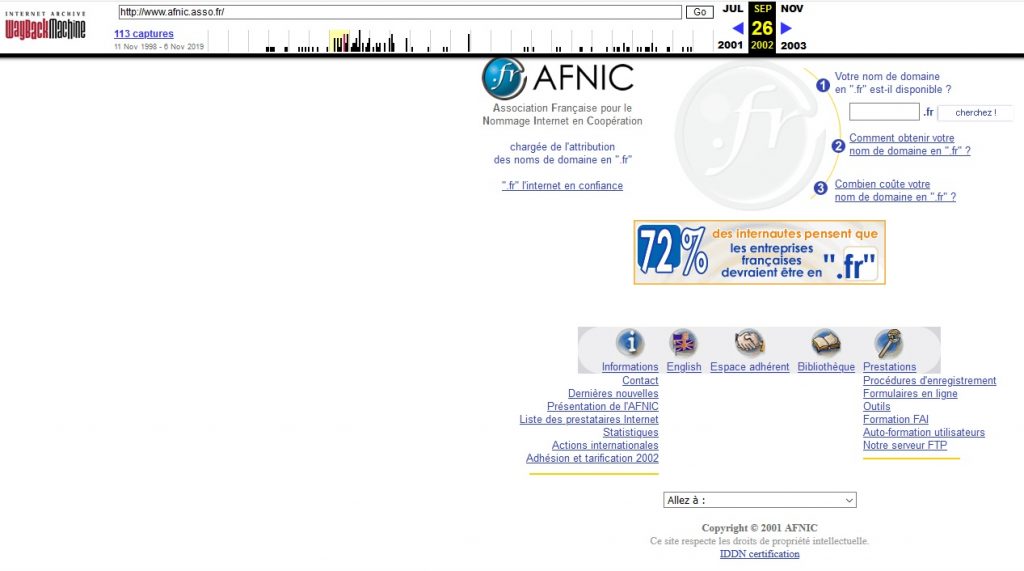Domain name history
Domain name searches can be used to retrieve the whois history of a domain name or older versions of a website.
Knowing the history of a domain name is a lifesaver in more ways than one.
In a domain name buyback situation, for example, it’s a good idea to check the history of the domain name.
Check a domain name’s reputation
Why would you do this? Imagine that the domain name you’re buying has previously been used to sell counterfeit goods or spam. Its e-reputation will be catastrophic. It will surely be blacklisted by the search engines.
A free domain name is sometimes misunderstood. When you do a domain name availability search with a registrar, names are ready to be registered.
Before buying your domain name from an accredited registrar such as Gandi, OVH or Solidnames, check its indexing in Google.
Specifically, type the query site:lenomdedomaine to find out the number of indexed pages.

It should be noted that a free domain name may have been used in the past.
The previous owner may have forgotten to renew his domain name. Sometimes, it’s even cancelled because of a Google penalty.
Whois History of a domain name
The “whois” (contraction of “who is?”) provides useful information about a domain name.
A “whois” search provides information on: domain name creation, future expiration date, owner, administrative and technical contacts, DNS servers, registrar.
The history of a “whois” (“Whois History”) can be used to keep track of past modifications.
The Whois History answers many questions. Has the domain name always been registered? Which registrars have been in charge of the domain name? Who has owned the domain?
Find the owner of a domain name
The most important aspect in the history of a domain name is the history of its various holders.
In the event of domain name cybersquatting disputes, this information is crucial.
The World Intellectual Property Organization(WIPO) offers an out-of-court procedure for resolving domain name disputes. It is known as the “UDRP”. Under these rules for resolving domain name disputes, changes of ownership are studied.
“Regardless of the initial creation date, if a respondent acquires a domain name after the complainant has acquired trademark rights, the center will look at the circumstances on the date the UDRP respondent itself acquired the domain name.”
A change of owner in the “whois” can therefore redistribute the cards in a domain name dispute.
The production company behind the SUPER NANNY TV show was thus able to recover a domain name previously registered and operated legitimately in 2000. It noted a change in ownership and content in 2018. On the basis of a “Whois History”, the company recovered the disputed domain name, which had changed ownership following the registration of its now earlier trademark in 2006.

Solidnames offers its “whois” domain name history search service for €96 plus VAT.
Users of “SecURL” domain name monitoring benefit from daily whois archiving of the monitored name.
Website history
Let’s face it, when you’re looking for a tool to find the old version of a website, archive.org comes immediately to mind.
In April 2020, their free tool for going back in time on the web counts 425 billion archived web pages.
By entering the registered domain name in their search engine, their database shows the number of previous screenshots. You can then access previous versions, cf. illustrations below for Afnic.fr, the French domain name registry.


Acknowledging the probative value of Archive.org
Can archived website pages be used in an intellectual property dispute? The answer is yes.
Let’s start by examining a July 5, 2019 decision concerning a website accused of copyright infringement and database producer infringement. The Paris Court of Appeal recognized the probative value of Archive.org pages, validly recorded by a bailiff.
To take another example relating to a patent infringement case, the Paris Court of Appeal confirmed that the probative value of Archive.org. It cannot be denied “in the absence of any contrary element likely to cast doubt on its reliability”.
Finding a lost website
Website history is useful in domain name disputes.
For example, it proves at a given moment that a third party is using your brand without authorization.
This history search is sometimes the last lifeline to finding your own missing website.
In the event of a major malfunction of your website without a valid backup, you’ll be able to recover a version of your site before the incident.
In addition to archive.org searches, Solidnames provides access to private databases of old screenshots.
This “Screenshot History” service traces the history of a domain name in use.
Some domain names not available on archive.org are archived at Solidnames. The domain name web history search service is offered by Solidnames at €96 ex VAT.
With “SecURL” domain name monitoring, users benefit from daily archiving of the website of the monitored name.